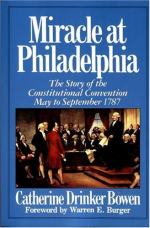
|
| Name: _________________________ | Period: ___________________ |
This test consists of 15 multiple choice questions and 5 short answer questions.
Multiple Choice Questions
1. What does Edmund Randolph propose on the final day of the Convention?
(a) To empower Congress to cut canals where they are needed.
(b) To add a Bill of Rights to the Constitution.
(c) To hold a second general Convention after the people have a chance to examine the proposed Constitution.
(d) To empower Congress to establish a University.
2. Why is the Province of Maine worried about the new Constitution?
(a) They think it interferes with provincial government regulations.
(b) They think it is too restrictive on commerce.
(c) They think it prevents their separation from Massachusetts to become an independent state.
(d) They think it gives too many rights to Southern states.
3. Why is it necessary for the Western Territories to have an ocean port?
(a) It enables them to trade effectively with others.
(b) It enables them to fish and expand their diet.
(c) It enables them to travel and explore the rest of the continent.
(d) It enables them to have a navy in case of war.
4. Which member of the Committee of Style and Arrangement is said to be unequaled as an orator?
(a) Elbridge Gerry.
(b) Edmund Randolph.
(c) Rufus King.
(d) William Samuel Johnson.
5. Which delegate is the only Northerner at the Convention who refuses to sign the Constitution?
(a) Edmund Randolph.
(b) Elbridge Gerry.
(c) Roger Sherman.
(d) Alexander Hamilton.
6. Why is Amos Singletry opposed to the Constitution?
(a) He believes that Massachusetts loses too much power under a national government.
(b) He believes it favors the lawyers and the elite at the expense of the less-educated and less-well-to-do farmers.
(c) He believes it prevents Maine from separating from Massachusetts.
(d) He believes that it offers too much to the citizens of the Southern states.
7. Why is a permanent location for the new government more important than it is for the old government?
(a) Because the new President wants a permanent home.
(b) To provide a distinction from the old government, where Congress moves from city to city.
(c) To alleviate sectional differences, since Southern congressmen feel uncomfortable in the North.
(d) There are more congressmen, including those from the interior of the country, and there needs to be a consistency for travel purposes.
8. Who finally appears at the Convention a week after the Great Compromise is passed?
(a) Thomas Jefferson.
(b) The governor of New Jersey.
(c) The delegation from Kentucky.
(d) Two delegates from New Hampshire.
9. Why does Franklin believe foreign-born citizens are allowed to serve in Congress?
(a) Those who live elsewhere have more life experience to share.
(b) Their knowledge of commerce and trade in Europe helps a new government.
(c) Their choice to live in America indicates a depth of attachment to and affection for the country.
(d) Foreign-born citizens are more likely to support a national government.
10. Why do delegates to the Massachusetts Convention meet in Boston's Brattle Street Church?
(a) The State House is too small.
(b) Samuel Adams wants all meetings to open with prayer.
(c) The governor is an active member of the church.
(d) The church is the foundation of Massachusetts government.
11. What are foreign visitors to America surprised they don't see more frequently?
(a) Forests and trees.
(b) Poverty among white men.
(c) Slaves.
(d) Deer and wild life.
12. What are the Federalist Papers?
(a) The published version of Madison's notes from the Convention.
(b) A series of articles published in New York newspapers against the ratification of the Constitution.
(c) The published version of Washington's description of the Convention.
(d) A series of articles published in New York newspapers supporting the ratification of the Constitution.
13. Which delegate wishes to establish a national university supported by Congress?
(a) Elbridge Gerry.
(b) James Madison.
(c) George Washington.
(d) Alexander Hamilton.
14. In 1787, which state is not participating in the Union?
(a) Maryland.
(b) New York.
(c) New Jersey.
(d) Vermont.
15. Why is Pierce Butler opposed to foreigners without a long residence in America being elected to Congress?
(a) He believes that Congress functions more efficiently if they are all native English speakers.
(b) He believes such individuals bring attachments to other countries that are dangerous to American beliefs.
(c) He believes that foreigners are not capable of governing effectively.
(d) He believes that only native-born individuals understand democracy.
Short Answer Questions
1. What does Congress do eight days after receiving the Constitution?
2. Why does Madison oppose the popular election of the President?
3. What does Bowen describe as Madison's strength?
4. What is the delegates' decision regarding the location of a fixed seat for the national government?
5. Why does the Convention need to end by September?
|
This section contains 921 words (approx. 4 pages at 300 words per page) |

|




